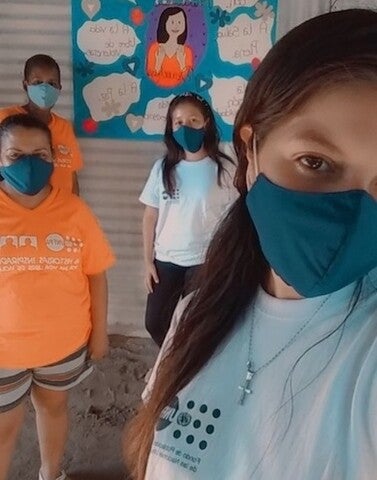News
Safe spaces in Colombia offer respite to Venezuelan migrants
- 25 February 2021
News
BOGOTÁ, Colombia – Griseida, 28, left Venezuela when she couldn’t find a job to feed her five children. Thirty-five-year-old Marlyng, too, left when there was no work to be found, leaving behind two of three children until she could get settled. They are just two of the approximate 1.6 million migrants in Colombia – the majority of whom have no status – to leave Venezuela’s years-long humanitarian crisis.
On 8 February, Colombia’s president Iván Duque gave fresh hope to Venezuelan migrants by granting them temporary legal status for 10 years, at which point they can apply for residency. The much-lauded move allows migrants to work and access health care. According to the United Nations Refugee Agency, there are an estimated 5.4 million Venezuelan migrants and refugees around the world. According to a January report, 162,000 caminantes (migrants on foot) will pass through Colombia this year. Many of the women and girls are at risk of sexual exploitation and violence. As of December 2020, foreigners reporting the highest number of cases of violence were Venezuelan women, according to the Integrated Information System on Gender Violence (SIVIGE).
UNFPA has seen the influx firsthand, with 19 safe spaces established in Norte de Santander and Arauca on the Colombian-Venezuelan border as well as in Nariño and Chocó on the Pacific side. In 2019, more than 350 women were trained as community leaders to identify and mitigate gender-based violence risks and aid in prevention and response. They were able to serve more than 4,000 Venezuelan migrant women, indigenous women, Afro-descendants, victims of Colombian armed conflict and local women at high risk of gender-based violence.
When the COVID-19 pandemic hit, all safe space activities went virtual. This year, UNFPA plans to open six more spaces, which will offer the same psychosocial services, information and activities for an additional 3,200 women.
Voices of Venezuelan migrants
The community leaders are not simply providing outreach to migrant women. They are also sharing their own stories of strength and survival to inspire others.
Griseida, for instance, speaks openly about the violence she experienced en route to Venezuela in 2018, and how, as a migrant, felt she had no rights in Colombia. But after visiting a safe space, she learned she did.
She was also able to get an implant to prevent future pregnancies, she recalled in a video produced for the “With All Senses” campaign publicizing the real experiences of migrant women. Griseida also speaks to other women, whose shoes she once stood in, about gender-based violence and sexual reproductive health and rights. “I feel happy for helping women who are going through difficult situations,” she said. “No one but us who come from a past of violence can help persons who are suffering today. Even if I have to go to the end of the world to save a woman who is mistreated, I will be there.”
Paying it forward
Marlyng, too, is raising her voice. For a year after she arrived in 2017, she survived on the kindness and donations from strangers until she was able to live on her own. To pay it forward, she opened her own home to migrating countrymen who needed a place to sleep – once, 26 people stayed with her. One of those guests was a girl who was being abused by her partner. Marlyng accompanied her to a UNFPA safe space. The girl never returned, but Marlyng was asked to become a community leader.
“I have always been a helpful person,” she said. “Being a leader gives me the opportunity to help women. To be able to support them, tell them they are not alone moves my heart greatly.”

Juliana, a Colombian-Venezuelan 17-year-old student and community leader, has lived in both countries and has been attending a safe space for about a year. “I have learned about my rights and about possibilities,” she said. “I have explained to schoolmates the value we have as women and that we cannot remain silent in the face of violence, whether physical or verbal.”
It was at the safe space that she first learned about sexuality education; now she understands that in order for her to reach her goal of becoming a psychologist, she can’t get pregnant at a young age. Most of all, “I like it because it helps us to value ourselves as women, to raise our self-esteem and to love ourselves.” It’s a lesson that should defy all borders.